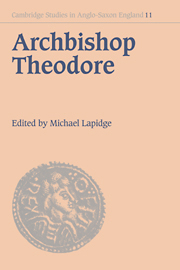Book contents
- Frontmatter
- Contents
- Preface
- List of abbreviations
- 1 The career of Archbishop Theodore
- 2 The Syriac background
- 3 Theodore of Tarsus and the Greek culture of his time
- 4 Rome in the seventh century
- 5 Theodore, the English church and the monothelete controversy
- 6 The importation of Mediterranean manuscripts into Theodore's England
- 7 Theodore and the Latin canon law
- 8 The Penitential of Theodore and the Iudicia Theodori
- 9 Theodore and the Passio S. Anastasii
- 10 Theodore and the Laterculus Malalianus
- 11 Theodore and the liturgy
- 12 Theodore's Bible: the Pentateuch
- 13 Theodore's Bible: the gospels
- 14 Theodore and Anglo-Latin octosyllabic verse
- 15 The Canterbury Bible glosses: facts and problems
- Index
13 - Theodore's Bible: the gospels
Published online by Cambridge University Press: 03 May 2010
- Frontmatter
- Contents
- Preface
- List of abbreviations
- 1 The career of Archbishop Theodore
- 2 The Syriac background
- 3 Theodore of Tarsus and the Greek culture of his time
- 4 Rome in the seventh century
- 5 Theodore, the English church and the monothelete controversy
- 6 The importation of Mediterranean manuscripts into Theodore's England
- 7 Theodore and the Latin canon law
- 8 The Penitential of Theodore and the Iudicia Theodori
- 9 Theodore and the Passio S. Anastasii
- 10 Theodore and the Laterculus Malalianus
- 11 Theodore and the liturgy
- 12 Theodore's Bible: the Pentateuch
- 13 Theodore's Bible: the gospels
- 14 Theodore and Anglo-Latin octosyllabic verse
- 15 The Canterbury Bible glosses: facts and problems
- Index
Summary
As a guide to the gospel text used at Canterbury by Archbishop Theodore, the lemmata in Milan, Biblioteca Ambrosiana M. 79 sup. are limited in two ways: they are few in number, totalling only 127, and one-third of them are of single words. When set against the number and variety of gospels available in the seventh century, so small a sample makes difficult the identification of particular textual affiliations.
The text is Vulgate and not Old Latin, being supported by Vulgate witnesses in nearly all readings, and the following lemmata have little or no Old Latin support. (The numbers on the left are those in Biblical Commentaries, ed. Bischoff and Lapidge, and the sigla for textual witnesses are explained in the Appendix, below, pp. 258–9.)
EvII 25 Matth. XII. 1: ‘sata’, where most Old Latin witnesses have ‘segetes’, except for Xdl and the mixed text Ea.
EvII 28 Matth. XIII. 33: ‘sata’, where most Old Latin witnesses give ‘mensura’, except for Xk (‘sata’) and Xlo and the mixed Ea (all three have ‘satis’ here).
EvII 58 Matth. XXVII. 6: ‘corbanan’, where most Old Latin witnesses have ‘loculum’, ‘corbam’ or ‘corba’, except for XI (‘corbanan’) and Xo (‘corbanam’).
EvII 67 Mark III. 21: ‘(quoniam) in furorem reuersus est’, where Old Latin witnesses give ‘quoniam exsentiat eos’, except for XI and the mixed Ea Jg.
EvII 78 Mark IX. 48: ‘omnis enim uictima salietur’. It is the accompanying commentary on this lemma which might just indicate use of the Vulgate.
- Type
- Chapter
- Information
- Archbishop TheodoreCommemorative Studies on his Life and Influence, pp. 255 - 259Publisher: Cambridge University PressPrint publication year: 1995

